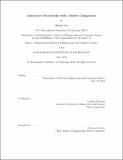| dc.contributor.advisor | Cynthia Breazeal. | en_US |
| dc.contributor.author | Lee, Hanna (Hanna X.) | en_US |
| dc.contributor.other | Massachusetts Institute of Technology. Department of Electrical Engineering and Computer Science. | en_US |
| dc.date.accessioned | 2018-12-18T19:48:06Z | |
| dc.date.available | 2018-12-18T19:48:06Z | |
| dc.date.copyright | 2018 | en_US |
| dc.date.issued | 2018 | en_US |
| dc.identifier.uri | http://hdl.handle.net/1721.1/119742 | |
| dc.description | Thesis: M. Eng., Massachusetts Institute of Technology, Department of Electrical Engineering and Computer Science, 2018. | en_US |
| dc.description | This electronic version was submitted by the student author. The certified thesis is available in the Institute Archives and Special Collections. | en_US |
| dc.description | Cataloged from student-submitted PDF version of thesis. | en_US |
| dc.description | Includes bibliographical references (pages 103-105). | en_US |
| dc.description.abstract | The strong correlation between children's early literacy skill and later academic (and economic) success has motivated much research into how children learn to read and what interventions aid the learning process. Research shows that children's reading ability improves through shared reading exercises with parents, personalized feedback and curriculums, and reinforced associations between audio and visual representations of words. These findings, along with recent advances in technology, have prompted questions about the efficacy of modern educational systems, including digital books, online language learning programs, and robot tutoring systems. There is much interest in these technologies because they have the potential to provide interactivity, personalization, and scalability. At the same time, as with all new technologies, it is essential to consider the accessibility of such experiences, and take steps to make the technology easily usable and available. This thesis explores the concept of an easily authorable interactive storybook with a robot peer tutor, combining several previously studied ideas into one system. One major contribution of this work is a novel interactive reading system consisting of a storybook tablet app, a robot tutoring agent, and an online authoring interface that anyone can use to create stories for the app. Another major contribution is the design and implementation of a user study in which children and parents interact with the system, and the subsequent evaluation of the system across the dimensions of child learning, interaction design, and engagement. The results of the user study suggest that children improve their knowledge of the pronunciation and meaning of target words in the story through participating in the interactive reading experience with the robot, and that both parents and children find the experience engaging. The presentation of these results is followed by a discussion of technical limitations of the system and ways to improve the interaction for future deployment at a larger scale. | en_US |
| dc.description.statementofresponsibility | by Hanna Lee. | en_US |
| dc.format.extent | 105 pages | en_US |
| dc.language.iso | eng | en_US |
| dc.publisher | Massachusetts Institute of Technology | en_US |
| dc.rights | MIT theses are protected by copyright. They may be viewed, downloaded, or printed from this source but further reproduction or distribution in any format is prohibited without written permission. | en_US |
| dc.rights.uri | http://dspace.mit.edu/handle/1721.1/7582 | en_US |
| dc.subject | Electrical Engineering and Computer Science. | en_US |
| dc.title | Interactive storybooks with a robot companion | en_US |
| dc.type | Thesis | en_US |
| dc.description.degree | M. Eng. | en_US |
| dc.contributor.department | Massachusetts Institute of Technology. Department of Electrical Engineering and Computer Science | |
| dc.identifier.oclc | 1078689708 | en_US |
